Beyond the Messy Truth: How We Came Apart, How We Come Together
by Van Jones
[Book]
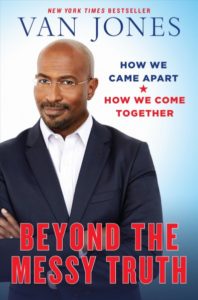
view/request
The “messy truth” to CNN commentator and progressive activist Van Jones is that the country was primed for a revolution regardless of the candidates in the 2016 presidential election. He elucidates the history of the increasing divide between the four segments of American political life he identifies, and makes suggestions for both liberals and conservatives for understanding, corrective action, and finding commonalities across what seems a huge chasm. In spite of the detailing of serious problems like the epidemic of addiction, Beyond the messy truth isn’t a depressing read because of solutions offered. Fresh ideas, persuasively expressed. Strongly recommended regardless of your politics, though progressives may find the most to digest here.
Reviewed by Linda
Tagged: Non-fiction, Politics
Middlesex
by Jeffrey Eugenides
[Book]
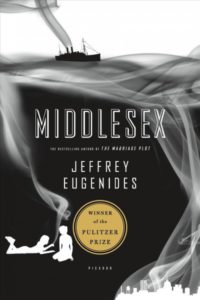
view/request
Middlesex is an multi-generation immigrant family drama limned by an omniscient narrator with a serious predicament. At turns funny and poignant, it is about identity and finding where you belong, including inside your own skin. Winner of the Pulitzer for fiction in 2003; I highly recommend this lushly written page turner.
Reviewed by Linda
Tagged: Coming-of-age, Fiction
Urn Burial
by Kerry Greenwood
[Book]
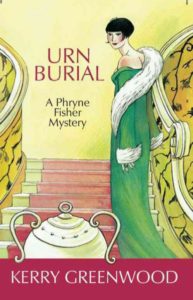
view/request
An English country house mystery, but set in the Australian countryside in the 1920s. Greenwood’s Phryne Fisher, a woman of independent means and modern attitudes, detects the solution to a number of mysteries involving her hosts and fellow guests including a servant’s murder. Fans of Dorothy Sayers’ Lord Peter should give this series a try.
Reviewed by Linda
Tagged: 1920s, Australia, Cozy mystery, Mystery
God, a guide for the perplexed
by Keith Ward
[Book]
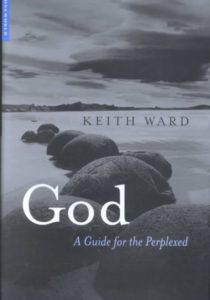
view/request
No perplexity required. A survey of beliefs about God, primarily in the West, beginning with ancient Greece. From the common folk to philosophers both famous and obscure. Sprinkled with wry humor and anecdotes. Recommended for history buffs, particularly those interested in the evolution of Christian beliefs.
Reviewed by Linda
Tagged: Non-fiction, Religion
Autonomous
by Annalee Newitz
[Book]
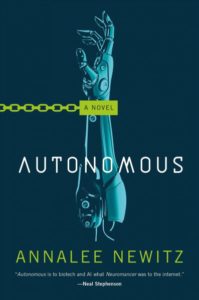
view/request
Imagine a future in which genetic engineering is commonplace, artificial intelligence has advanced to the point where machine consciousness is taken for granted, and robots, which are built from a mixture of electrical, mechanical, and biological components, are an accepted part of everyday life. Property is key in this world. Robots can be owned, and people too, but the most valuable property is information, and corporations will do nearly anything to defend their patents. The individual in this world, whether human or machine, has few rights and less power.
Annalee Newitz’s Autonomous is set in such a world. Jack is an anti-patent pirate, skilled at chemical and bio engineering and determined to make pharmaceuticals available to those who need them, but she is in trouble when she realizes the dangers inherent in a new highly addicting productivity drug. Meanwhile Paladin, an AI, and Eliasz, both employed by a military organization dedicated to protecting intellectual property, are on her trail.
Told from varied perspectives, including the perspective of a new Artificial Intelligence learning about the world, Autonomous is a moving and engaging novel. With great characters, adventure, sci-fi, philosophy, and romance, it has a lot to offer. I enjoyed this book enormously!
Content warning: drug use and abuse; some sexual content; some violence which can be graphic at times, including a disturbing description of a torture during an interrogation
Reviewed by Ben
Tagged: Fiction, Science fiction
A Catalog of Birds
by Laura Harrington
[Book]
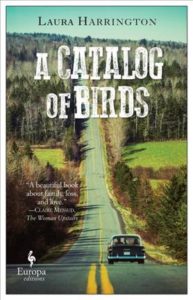
view/request
Laura Harrington’s A Catalog of Birds is a novel about a family in Geneva, NY and what happens when the youngest son, Billy, returns from Vietnam, a wounded veteran. It’s also about nature and listening, about trees and birds and lakes, about ambition, disappointment, loss and love. It is beautifully written and I would have happily continued to read about these people and this place had the book been twice as long, even though their story often brought me to tears.
Reviewed by Ben
Tagged: Fiction, Historical fiction, Literary fiction, Veterans
Carry On
by Rainbow Rowell
[Book]
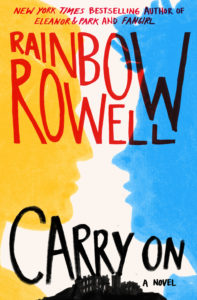
view/request
Rainbow Rowell’s Carry On reads like a compact and quirky alternative Harry Potter. The parallels are impossible to miss. Our protagonist had no knowledge of the magical world until he was discovered and brought to a magic school where he quickly makes friends and begins a series of fantastic adventures. We have characters who clearly have analogs in Harry, Hermione, Draco, Hagrid, and Voldemort, and there are more subtle references as well. Carry On is more than an homage, however. It is an engaging fantasy with good world building and a satisfying plot. Many aspects of the book simply seem better than they have to be, which is delightful. The story is told from a number of viewpoints, each of which satisfyingly reveals something different about the characters. (The everchanging dynamic between our protagonist Simon and his rival Baz is a driving force in the book, and the contrast between their individual perspectives is part of what makes the book work so well.) The world is well thought out with complex politics and an intriguing, novel, and entertaining magic system. And Carry On is compact—it is as if Rowling had decided to tell the entire Harry Potter story in a single Harry Potter and the Sorcerer’s Stone sized volume that concentrated mainly on Harry’s last year, only touchiching upon earlier adventures in brief flashbacks.
Reviewed by Ben
Tagged: Coming-of-age, England, Fantasy, Fiction, LGBTQ
The Dispossessed: A Novel
[Book]
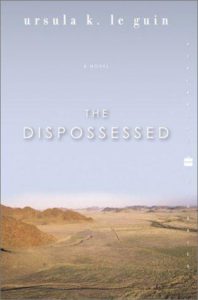
view/request
Shevek is born in a world created by anarchists. This world, a moon in fact, is home to a planned society in which the concept of property does not exist and the language has been designed to discourage selfish thought. The people there have very little contact with the world from whence they came—the capitalist planet of Urras. Shevek is a brilliant physicist whose groundbreaking work is too advanced to be understood by his colleagues. If he wishes to continue his research he must, therefore, visit Urras and work with the scientists there.
Le Guin’s writing is excellent. In telling the story of Shevek, of his research, and of his journey, she also subtly explores some very interesting ideas about culture, language, government, and psychology. This imaginative work, like most of Le Guin’s science fiction, stands alone, and if you have never read any Le Guin this would be an excellent place to start. And if you like it you will find that Le Guin has written many more excellent books set in the same universe.
Reviewed by Ben
Tagged: Dystopia, Fiction, Science fiction, Utopia
Claire of the Sea Light
[Book]
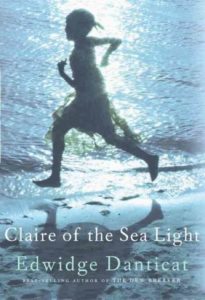
view/request
In Claire of the Sea Light, Edwidge Daticat tells a number of stories, each of which interconnects with and is enhanced by the others. The stories are all set in the fictional Haitian town of Ville Rose, a fishing community where fishing is no longer profitable, the lighthouse no longer possesses a lantern, the few wealthy residents worry that their homes will be washed away, and the town mayor is also the undertaker.
The protagonists of these stories are sympathetic, well meaning, good people, but life is not particularly good to them. Neither education nor wealth is enough to escape from the misfortunes of Ville Rose, and few are lucky enough to have either. There are many tragedies in these stories—deaths, crimes, and injustices—and yet I don’t think it is a book about sadness or tragedy. Instead it is about a place and the interconnections between the people there. It is about the connections between a radio announcer and her listeners, a teacher and his pupils, parents and children, and also about the inner lives of them all, and how each one effects the others. It is a beautiful book with stories worthy of contemplation, recollection, and rereading.
Reviewed by Ben
Tagged: Fiction, Haiti, Literary fiction
Crosstalk
by Connie Willis
[Book]
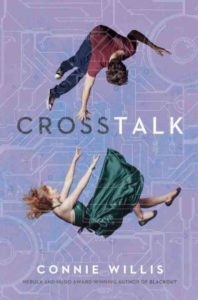
view/request
Crosstalk is a near-future science-fiction romance which explores our always-connected, always-on culture, and like so many of Connie Willis’s stories it is almost-but-not-quite too complicated, a bit neurotic, and wonderfully entertaining. The story centers on a couple of employees at a small smartphone company that is trying to outdo Apple, but one of them has a secret and fears that they might succeed all too well.
Connie Willis is great at witty dialogue, improbable situations, and fun, unexpected plots. She’s one of our favorite authors here at Forbes Library, and this, her newest offering, is a very fun read (even if it doesn’t have time travelling Oxford historians!)
Reviewed by Ben
Dandelion Wine
[Book]
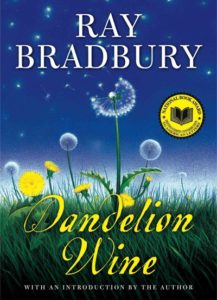
view/request
Dandelion Wine is Ray Bradbury’s novel of a child’s summer in a small Illinois town. In the first few pages of the novel Douglas Spaulding, the twelve-year-old protagonist, is stuck by the alarming thought that he is alive, “I’m really alive! he thought. I never knew it before, or if I did I don’t remember!”
This is the first of many revelations Douglas will have over the course of the summer. Douglas’s summer is a time of brightness and joy to be cherished, but still, by its end he has transformed himself, having struggled with issues of identity, age, fear, and mortality.
Like so many of Ray Bradbury’s novels, Dandelion Wine is episodic, essentially a collection of stories many of which can stand alone. Douglas features in many of these stories, but several stories feature other characters, among them: Leo Auffmann, who attempts to build a happiness machine; Helen Loomis, who is 95 and never married, but shares a mutual admiration with the much younger Bill Forester; and Mr. Jonas, the maybe magical and certainly mysterious town junkman who heals Douglas when he is ill.
Dandelion Wine reads quickly but offers much worth dwelling on. The stories are memorable, the setting and characters are both characterful and yet sufficiently loosely described so as to seem universal, and the writing is engagingly snappy and colorful. Forbes Library’s Afternoon Book Discussion discussed Dandelion Wine in August and we had a very lively, enjoyable discussion. Very much recommended.
Reviewed by Ben
Girl Meets Boy: The Myth of Iphis
[Book]
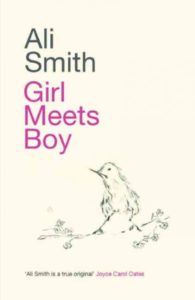
view/request
In Ovid’s Metamorphosis, tucked away between stories about just how cruel gods & monsters & men can be, is a happy myth about a girl falling in love with another girl. In Girl Meets Boy, Ali Smith takes this myth of Iphis and Ianthe into the twenty-first century, and the result is a story that celebrates transformation, love, and civil disobedience.
In Inverness, dreamy twenty-something Anthea quits her corporate job, to the chagrin of her serious-minded older sister, Imogen, and promptly falls in love with a graffiti artist. Anthea and her modern-day Iphis joyfully thwart conventions of sex and gender in this decidedly queer retelling. Told from the perspectives of Anthea and Imogen, Girl Meets Boy is written in Smith’s signature (& humorous!) steam-of-conscious style. Her love of wordplay and ear for conversations make it perfect to be read aloud.
Reviewed by Sarah
Tagged: Fiction, Literary fiction, Mythology, Women












